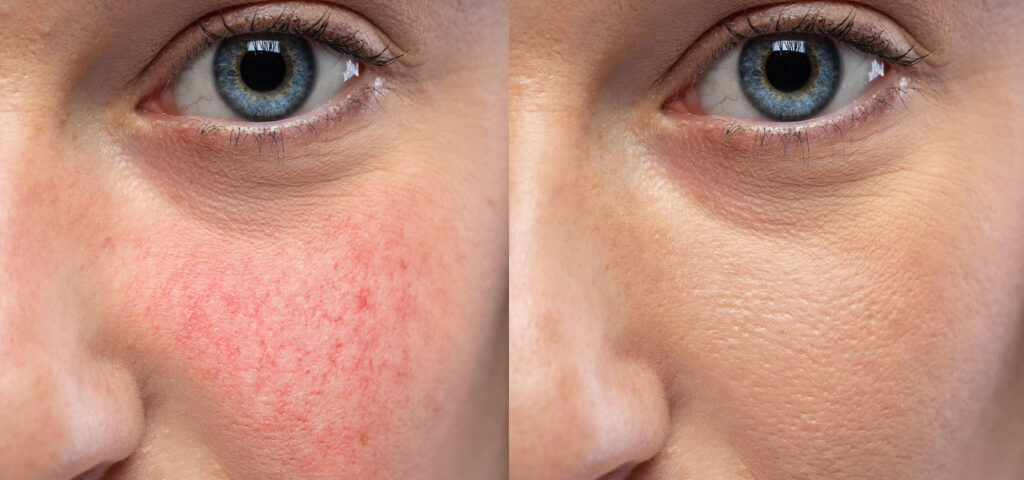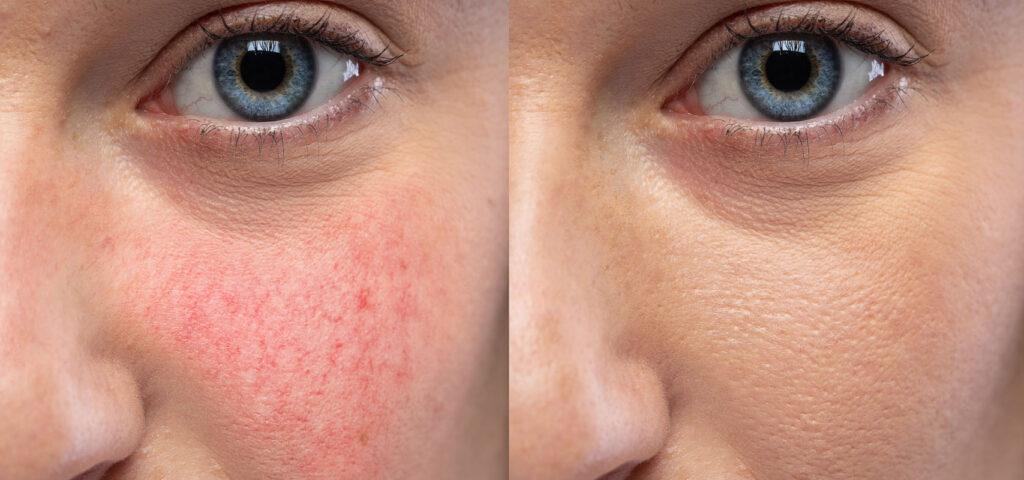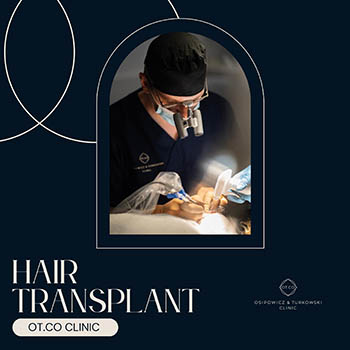TL;DR:
- Characteristics of vascular skin: Red/purple tint due to dilated blood vessels, common on the nose, cheeks, chin; prone to irritation and sensitive to sun, wind, and extreme temperatures.
- Causes: Genetics, UV exposure, extreme temperatures, aging, smoking, stress, and improper skincare.
- Effective treatments:
- Laser therapy & IPL: Close visible blood vessels.
- Electrocoagulation: Removes smaller blood vessels.
- Chemical peels: Exfoliate and reduce redness.
- Redness Treatment: Serum with rozatrol technology to reduce redness and unify skin tone.
- Cold compresses: Temporarily soothe redness.
- Prevention tips: Use sunscreen, avoid extreme temperatures, limit spicy food/alcohol, stay hydrated, use gentle cosmetics, reduce stress. Consult a professional for personalized care.
Vascular skin is one of the many challenges faced by those concerned with the health and appearance of their skin. The skin is characterized by dilated blood vessels that give it a reddish, sometimes even purple tint. Problems with vascular skin can be caused by various factors, such as genetics, exposure to the sun, excessive stress or a tendency to skin irritation. The task of various cosmetic treatments dedicated to vascular skin is not only to reduce the appearance of blood vessels, but also to soothe inflammation and improve the overall appearance of the skin.
What are the characteristics of vascular skin?
Dilated blood vessels on the surface of the skin is the main feature by which you will recognize vascular skin. It often manifests with red, sometimes purple discoloration, especially around the nose, cheeks and chin. An important element of this problematic skin is also an increased tendency to irritation, sensitization and reactions to various external factors.  Superficial blood vessels become easily visible, which affects the overall appearance of the skin. In addition, it is more sensitive to atmospheric factors such as the sun or wind, which can lead to increased inflammation and irritation. Vascular skin requires special attention and gentle care. The right methods and appropriate cosmetic treatments can help reduce the appearance of blood vessels, soothe inflammation and improve the overall condition of the skin. Taking care of it requires understanding its peculiarities and adjusting your skin care routine.
Superficial blood vessels become easily visible, which affects the overall appearance of the skin. In addition, it is more sensitive to atmospheric factors such as the sun or wind, which can lead to increased inflammation and irritation. Vascular skin requires special attention and gentle care. The right methods and appropriate cosmetic treatments can help reduce the appearance of blood vessels, soothe inflammation and improve the overall condition of the skin. Taking care of it requires understanding its peculiarities and adjusting your skin care routine.
Causes of vascular skin
Superficial blood vessels are delicate and thin. Depending on the temperature, they can easily dilate and constrict, sometimes making them more visible. Other causes of vascular skin we can include:
- genetic factors – the tendency to dilate blood vessels can be hereditary. If there is a family history of vascular skin problems and skin sensitivity, it is more likely that the offspring are also at an increased risk of developing this type of problem,
- exposure to the Sun – UV radiation can cause damage to blood vessels, leading to their dilatation and expansion. Prolonged exposure to the sun without adequate protection in the form of SPF sunscreen, can increase the risk of vascularity,
- excessive exposure to extreme temperatures – the impact of extreme weather conditions. Both cold and heat can affect the elasticity of blood vessels, leading to a loss of elasticity,
- age – as we age, the skin loses its natural elasticity and blood vessels become more prone to dilatation. This phenomenon is a natural process of skin aging,
- Cigarette smoking – chemicals present in cigarette smoke can cause constriction of blood vessels, which impedes proper blood circulation and can lead to dilatation in the long term,
- excessive stress – prolonged stress adversely affects the circulatory system, leading to the dilatation of blood vessels. This phenomenon is often noticeable in the facial area,
- inadequate skin care – use of aggressive cosmetics, overuse of the skin in the form of mechanical squeezing of blackheads or imperfections, as well as neglect of daily skin care can contribute to problems with blood vessels.
Vascular skin – what treatments are effective?
For people with vascular skin, there are a number of effective aesthetic medicine procedures that help reduce the appearance of blood vessels, soothe irritation and improve the overall condition of the skin. We can include the following procedures:
- laser therapy – treatments, such as laser blood vessel removal (laser blood vessel treatment), can effectively reduce the appearance of blood vessels on the skin. The laser works by selectively damaging blood vessels, leading to their closure and gradual disappearance,
- IPL (Intense Pulsed Light) therapy – similar to laser therapy, IPL light therapy uses pulsed light to intentionally close blood vessels. It is an effective method for reducing erythema and improving the overall appearance of the skin,
- electrocoagulation – this method involves the use of electric current to close dilated blood vessels. Electrocoagulation is effective in removing individual blood vessels, especially smaller ones,
- chemical peels – Gentle chemical peels can help exfoliate dead skin while improving skin texture and reducing redness. Salicylic acid, lactic acid or mandelic acid are often used in peels for vascular skin,
- Cold compresses – the use of cold compresses can help constrict blood vessels and soothe redness. The cold reduces the permeability of blood vessels, which temporarily improves their appearance,
Before proceeding with any treatment, it is recommended to consult a dermatologist or aesthetic medicine specialist to tailor the treatment to the patient’s individual needs and skin condition. At OT.CO Clinic’s aesthetic medicine office, we rely on an interview with the client to understand their needs and rule out any contraindications.
Redness Treatment – treatment for vascular skin.
Redness Treatment is a treatment focused on reducing redness, which is an effective answer to the problems associated with vascular skin. This cosmetic treatment is designed specifically for those struggling with visible blood vessels and skin redness. The Redness Treatment involves the use of a special serum to combat redness. It is based on innovative rozatrol technology, which makes it possible to gently yet effectively reduce redness and acne lesions on the skin. The composition of the serum includes many active ingredients – including, among others, an amino acid complex and antioxidant substances. Thanks to this unique combination of ingredients, the treatment guarantees a subtle and effective solution for those struggling with vascular skin problems, while providing protection against negative environmental factors. Its action includes gentle exfoliation of the epidermis, which contributes to smoothing the skin. However, its main benefit for the skin is the simultaneous unification of the skin’s color, by effectively reducing redness. The product not only eliminates dead skin, but also contributes to harmonizing the skin tone, giving it a healthy, youthful appearance.
Procedures are tailored to the individual needs of the patient. A professional cosmetologist or dermatologist analyzes the condition of the skin, the type of redness and any other factors affecting the vascular complexion in order to tailor the therapy to the specific case. What’s more, patients are often given tips on effective home care. These include appropriate selection of cosmetics, avoidance of irritating ingredients and regular use of sunscreen. Redness Treatments provide a comprehensive approach to the problem of vascular skin, combining advanced technologies with an individualized approach to the patient’s needs.
How to protect the skin from the development of a vascular complexion?
As a preventive measure, it is a good idea to implement a few simple habits to protect the skin from the formation of a vascular complexion and minimize the risk of dilating blood vessels. First, regular use of sunscreen helps protect the skin from the harmful effects of UV rays, which can lead to the dilatation of blood vessels. So choose products with high SPF and apply them even on cloudy days. Avoid prolonged sunbathing, as this exposes the skin to the Sun, which can cause damage to blood vessels. Limit the amount of time you spend in the sun, especially during peak sunlight hours. Too hot baths or showers can cause blood vessels to dilate. Therefore, it’s a good idea to choose warm water and avoid extreme temperatures. Similarly, when it comes to low temperatures. In such atmospheric conditions, the skin can react by dilating blood vessels. Nutrition is also important. Pay attention to the amount of fluids consumed throughout the day, as keeping the skin hydrated helps keep it supple and healthy. As for the consumption of spicy foods, alcohol and other potentially irritating substances, try to avoid them as much as possible, as they can affect the dilatation of blood vessels. It’s also worth paying attention to the quality of the cosmetics you use in your daily care. Opt for gentle cosmetics and try to avoid aggressive substances in skin products. Choose gentle soaps, creams and toners that are safe for vascular skin. Mental health is a sphere that contributes to the overall appearance and condition of the skin. Long-term stress can affect the condition of blood vessels. Therefore, relaxation practices such as yoga and meditation can help maintain mental balance. Implementing these simple habits can help prevent vascular skin problems and promote healthy skin. It’s also a good idea to consult a dermatologist or cosmetologist to tailor skin care to individual skin needs.
Conclusion
Vascular skin requires specialized care and thoughtful prevention. By understanding its traits, managing triggers like sun exposure or stress, and exploring treatments like laser therapy and redness-focused solutions, you can effectively improve your skin’s appearance. Don't overlook daily habits, such as sunscreen use and gentle skincare, which offer long-term protection. Consistency, professional guidance, and tailored care are key to maintaining healthier, calmer skin. Prioritize what works best for your skin’s unique needs, and you'll see lasting results.






